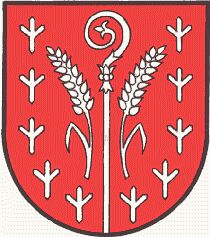Schachen bei Vorau: Difference between revisions
Jump to navigation
Jump to search
Knorrepoes (talk | contribs) m (Text replace - "Österreich" />" />" to "Österreich" />") |
Knorrepoes (talk | contribs) m (Text replace - "[[Literature" to "{{media}} [[Literature") |
||
| Line 16: | Line 16: | ||
Schachen was a possession of the Archbishop of Salzburg and of the Monastery of the Regular Canons of Vorau. This is symbolised by the two crosiers in the arms. The name of the municipality, Schachen, is an old word, meaning open forest or woodside, so sprigs of fir were included into the arms along with the wheat-ears, which are well-known symbols of agriculture. | Schachen was a possession of the Archbishop of Salzburg and of the Monastery of the Regular Canons of Vorau. This is symbolised by the two crosiers in the arms. The name of the municipality, Schachen, is an old word, meaning open forest or woodside, so sprigs of fir were included into the arms along with the wheat-ears, which are well-known symbols of agriculture. | ||
{{media}} | |||
[[Literature]] : Image provided by Karl Palfrader (k.palfrader@aon.at), MStLA 40 (1990), p. 49 | [[Literature]] : Image provided by Karl Palfrader (k.palfrader@aon.at), MStLA 40 (1990), p. 49 | ||
Revision as of 05:43, 9 July 2014
| Heraldry of the World Civic heraldry of Austria - Österreichische Gemeindewappen |
SCHACHEN BEI VORAU
State : Steiermark
District : Hartberg
Origin/meaning
The arms were granted on October 16, 1989.
Schachen was a possession of the Archbishop of Salzburg and of the Monastery of the Regular Canons of Vorau. This is symbolised by the two crosiers in the arms. The name of the municipality, Schachen, is an old word, meaning open forest or woodside, so sprigs of fir were included into the arms along with the wheat-ears, which are well-known symbols of agriculture.
Contact and Support
Partners:
Your logo here ?
Contact us
© since 1995, Heraldry of the World, Ralf Hartemink 
Index of the site
Literature : Image provided by Karl Palfrader (k.palfrader@aon.at), MStLA 40 (1990), p. 49











